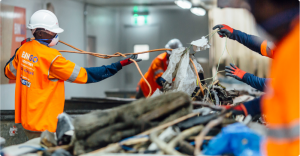What Can Go in a Skip Bin? A Comprehensive Guide
Skip bins are an efficient way to manage large volumes of waste from home renovations, cleanouts, or commercial projects. However, knowing what materials are acceptable for disposal in a skip bin is crucial for ensuring proper waste management and avoiding penalties. In this guide, we’ll explore what can and cannot go in a skip bin, helping you make the most out of your waste disposal solution.
Understanding Categories
General Waste
General waste, also known as mixed waste, is the most common category for skip bin use. This includes everyday household waste such as:
Food Scraps: Leftovers and kitchen waste.
Packaging Materials: Cardboard, plastic containers, and paper.
Non-Hazardous Household Items: Broken furniture, old clothes, and general clutter.
Ensure that all items in this category are clean and free from hazardous substances to avoid contamination.
Green Waste
Green waste is organic material that can be recycled into compost. This category includes:
Garden Waste: Grass clippings, leaves, branches, and tree trimmings.
Plant Materials: Dead plants, flowers, and vegetable scraps.
Green waste should be free from contaminants like plastic or metal, as these can affect the composting process.
Construction and Renovation Waste
For projects involving construction or renovation, skip bins can handle:
Wood: Untreated timber, planks, and plywood.
Concrete and Bricks: Debris from demolition or building activities.
Tiles and Plasterboard: Leftover or broken tiles and plasterboard.
Ensure that hazardous materials such as asbestos are not mixed with other waste. Special arrangements may be needed for their disposal.
Materials You Can’t Dispose Of
Hazardous Waste

What Can Go in a Skip Bin?
Hazardous waste requires special handling due to its potential to harm health or the environment. This includes:
Chemical Products: Paints, solvents, and pesticides.
Asbestos: A dangerous material that needs professional removal.
Batteries and Electronics: These contain toxic substances and should be recycled separately.
Always consult local regulations for proper disposal methods for hazardous materials.
Medical Waste
Medical waste, including:
Syringes and Needles: These pose a risk of infection and should be disposed of in specialized containers.
Expired Medications: Need to be taken to designated collection points.
Handling medical waste correctly is crucial to prevent health risks. https://woodysskips.com.au/rubbish-removal-gold-coast/
Large Appliances and Electronics
Large appliances and electronic items, such as:
Refrigerators and Freezers: These often contain refrigerants that must be properly managed.
Televisions and Computers: Contain hazardous materials like lead and mercury.
Many areas offer specific e-waste recycling programs to handle these items responsibly.
Tips for Effective Skip Bin Use
Sort Your Waste
Sorting waste before placing it in the skip bin can improve recycling efficiency. Separate general waste from green waste and ensure hazardous materials are disposed of correctly.
Follow Local Regulations
Regulations for skip bin use can vary by location. Always check with your local waste management authority to ensure compliance with local rules and avoid fines.
Use the Right Size Bin
Choosing the right size skip bin for your project helps avoid overloading and ensures efficient disposal. Consult with skip bin providers to select a bin that matches the volume and type of waste you need to dispose of.
Avoid Overloading the Bin
Overloading a skip bin can result in additional charges and potential safety hazards. Fill the bin evenly and ensure that the waste does not exceed the top rim of the bin.
Conclusion
Understanding what can and cannot go in a skip bin is essential for effective waste management and environmental responsibility. By adhering to these guidelines, you can ensure that your waste is disposed of correctly and efficiently. For more information or specific queries about skip bin use in your area, consult with local waste management services.
